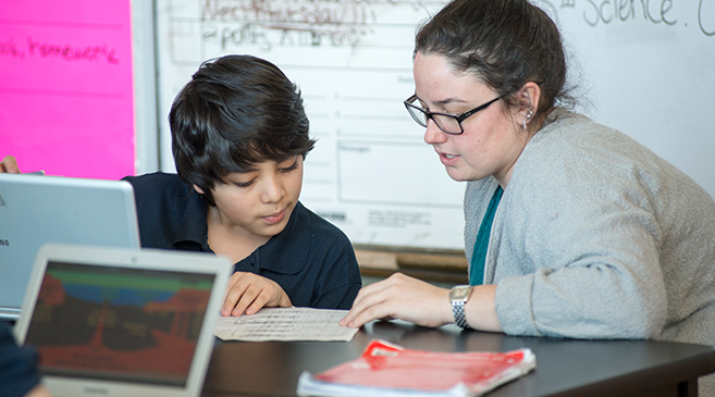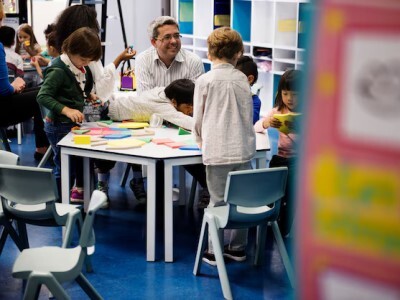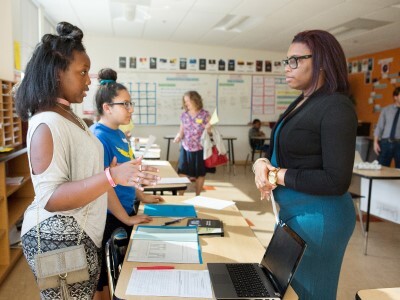What Does That Mean?
Topics

We’ve all had the experience of truly purposeful, authentic learning and know how valuable it is. Educators are taking the best of what we know about learning, student support, effective instruction, and interpersonal skill-building to completely reimagine schools so that students experience that kind of purposeful learning all day, every day.
Cornerstone Charter Health High School’s unique educator roles—Rigor Manager, Relevance Manager, Relationship Manager, Course Manager, and Lab Monitor—work together to support students’ learning.
Editor’s Note: This post is part of a series exploring breakthrough staffing models in K-12 education, to support school developers and leaders including those applying to NGLC’s open grant opportunity: Wave IV: Breakthrough School Models for College Readiness. It originally appeared on the blog at Blend My Learning.
When I tell people that my job titles are Science Rigor Manager and Relevance Manager at Cornerstone Charter Health High School (CCHHS), the inevitable response is “What does that mean?”. In simple terms, it means that my role as an educator is different in the blended learning model used at CCHHS. Because of the way our students spend their day, the connotation of the word “teacher” no longer seems appropriate.
Our students spend about half of their day working on individualized learning paths in our computer lab, or “Pod”. They are able to choose which subjects they work on each day and how long they spend on each subject. Based on the data the Rigor Managers see from the learning paths, we are able to design 30 minute workshops on specific content areas for only the students who need the additional instruction, making learning time more purposeful and therefore more valuable to all of our students. It also increases student accountability for their learning and teaches them essential time management skills, as they are responsible for putting their workshops into their calendar and showing up on time and prepared. It is much more like a modern business office than a traditional school.
Because of this blended learning approach, my role as an educator has changed drastically. I am no longer planning lessons for the average student and building in differentiation. I am no longer following a schedule where I see the same group of students at the same time every day. I am no longer building a classroom culture with those separate groups of students. A whole new level of organization, planning, flexibility, and creativity is involved.
I now plan my week by looking at up-to-the-minute data from my students’ individual learning paths. I see which students are struggling, which topics they are struggling with, which students are excelling, and how long each student is spending on my subject. Using that information, I plan workshops on specific topics for the students that are struggling and extension workshops for students that are moving more quickly. I send out invitations over email, and my students show up with their notes, ready to learn. I could be teaching a review of the scientific method in the morning and facilitating a debate on the pros and cons of carbohydrates in our diet in the afternoon.
To do this successfully, I cannot simply change a few things on a worksheet I gave out the previous year. I need to organize my handouts, grading and lesson plans in a way that allows me to switch gears every half hour to meet student needs. I cannot get all of my planning done on Sunday night, as I need data during the week to drive my plans for the next day. Instead of having 70 or 90 minutes to introduce, practice, and evaluate students, I need to get creative so that my students are using that 30 minutes of face-to-face time as effectively as possible.
Because I am only spending 30 minutes with students at a time, and I might not see them every day, that means that they are spending about half of their day in the Pod, or computer lab, with our Course Manager and Lab Monitor. These people are essential in building the culture of our school because they spend the most time with our students. Our Course Manager is responsible for all of the technology our students use, so someone with a computers background is essential to keep things running smoothly. Our Lab Monitor is mostly responsible for keeping students on task in the Pod, so classroom management skills are necessary. They oversee up to 70 students at one time, so this can be a challenge.
Another vital position in our organization is our Relationship Manager. Because students are transitioning from a traditional environment to a blended learning environment that demands responsibility at a level which they have not previously been exposed, our Relationship Manager supports our students’ social and emotional needs while helping them achieve academic success. This involves meeting with each student for at least 15 minutes per week to set goals and review progress in each subject.
The final role that differentiates our blended learning model from a traditional model is that of the Relevance Manager. In this position, my responsibility is to connect what students are learning in their learning paths and at their workshops to real-world applications through project-based learning. I see students twice per week for an hour each class where we focus on three things:
- College readiness
- Career preparation
- Service learning projects
This year, we have completed a project that has advertised different health-related job descriptions around the school, and we are currently working on service learning projects that are student-driven and focus on meeting different needs throughout the community while tying in each of the core content areas.
Overall, the blended learning model gives us a much greater flexibility to meet the needs of all students and push them to higher levels of achievement. To do this successfully, it requires a mindset shift from the traditional model as well as a different skill set. We are preparing our students for a different world, so we must do our jobs differently to help them be successful. This opens up a lot of opportunities for people to enter the field of education who are not certified teachers, but still vital to school operations.




